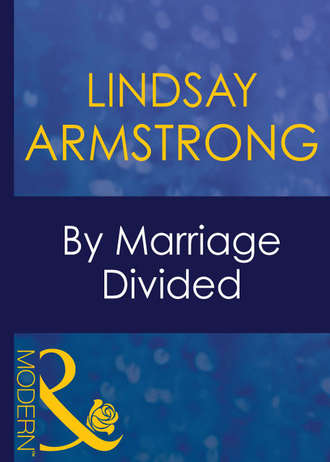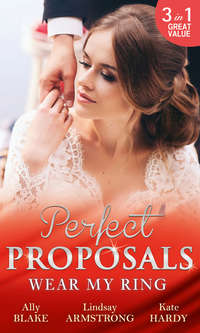
Полная версия
By Marriage Divided


Harlequin Presents®
is delighted to congratulate
Australian author
Lindsay Armstrong
on her 50th novel:
By Marriage Divided
Dear Reader,
Welcome to my fiftieth romance novel.
It all started with a book titled Spitfire, and since then I’ve had the best of both worlds. I’ve been able to combine a love of the genre with a career.
Looking back over fifty heroes and heroines, and their love stories, I’m still amazed at how real they are to me. And every time I finish a book I feel a sense of loss that I have to let them go. I do hope you enjoy Domenica and Angus Keir in By Marriage Divided as much as I enjoyed creating them—from the seed of an idea, then having them come alive for me and developing very definite personalities of their own!
And to all my readers, thank you so much. Without you, I couldn’t have done it.

Lindsay Armstrong
By Marriage Divided
Lindsay Armstrong

Contents
CHAPTER ONE
CHAPTER TWO
CHAPTER THREE
CHAPTER FOUR
CHAPTER FIVE
CHAPTER SIX
CHAPTER SEVEN
CHAPTER EIGHT
CHAPTER ONE
THE property was called Lidcombe Peace, two hundred acres on the Razorback Range only about an hour’s drive south of Sydney city towards the Southern Highlands.
The house, built on a hilltop with stunning views, had been designed with wide, stone-flagged verandas at ground level all around, cream walls and a shingled roof. On this perfect blue and gold summer day, it drowsed stylishly in the sunlight.
The girl standing on the veranda waiting for him was also stylish and looked to Angus Keir as if she belonged to this beautifully established and prestigious property, which, of course, she did—or had. For she was, he guessed, Domenica Harris, whose parents had built the present house although the property had been in the family for a lot longer.
Daughter of noted academic and historian, Walter Harris, and his well-connected wife Barbara, Domenica had had a privileged upbringing and been to all the right schools, his research of the family had turned up. And the only reason she was waiting for Angus Keir, who had clawed his way from beyond the black stump so to speak, to hand over the keys of the property to him, was because on her father’s recent death the Harris family fortunes had been discovered to be in turmoil, necessitating the sale of Lidcombe Peace.
So he had fully expected to be greeted by a daughter nursing a sense of grievance, not by a girl as serene-looking and lovely as this, he thought wryly as he got out of his car and approached the veranda; lovelier, indeed, than just about any girl he’d seen.
She was tall and dark-haired with pale, smooth skin, a beautifully defined jaw line with just the hint of a dimple in her chin. She also had deep blue eyes with impossibly long lashes and her thick hair was parted one side and ran in a river of rough silk to below her shoulders.
She carried a straw hat and a manila folder in her hand and wore a three-quarter length, button-through dress in some soft camellia-pink fabric. But the softness of what he didn’t know was voile highlighted instead of hid a near-perfect figure and sensationally long, thoroughbred legs. Her flat kid shoes matched the dress exactly.
And for a moment Angus Keir found himself meditating upon the shape of her breasts and the satiny softness of that smooth skin in secret places upon her delectable body.
Then she walked towards him and held out her hand. ‘Mr Keir? I’m Domenica Harris. How do you do? I was going to send my solicitor to perform this little rite, then I thought I ought to do it myself. Welcome to Lidcombe Peace and may you spend many happy years here!’
Angus Keir narrowed his eyes slightly. All this had been said in a cultured, musical voice and he’d expected no less. But there’d been no trace of grievance or even regret, and he wondered why the lack of it, in some mysterious way, niggled him.
‘How do you do, Miss Harris?’ he responded and shook her hand, finding her clasp firm, brief and businesslike. ‘It’s very kind of you to take the trouble. I hope this is not too painful for you.’
Domenica Harris studied him thoughtfully. Via a real estate agent, she and this man had conducted something close to a war over the exchange of Lidcombe Peace. And it had only been the fact that she’d had to sell some part of the family estate, and sell it quickly or see her mother face bankruptcy, that had finally induced her to accept his offer, which was a lot less than what she’d been asking, although still not an insignificant sum.
Accordingly, she’d tagged this Angus Keir in her mind as a tough customer, and pictured him as a lot older. But he was in his mid-thirties at the most, she judged, tall, with thick dark hair cut short and wearing an expertly tailored light grey suit with a midnight-blue shirt and navy tie. He also possessed the kind of stature that would make him stand out in a crowd, that broad-shouldered, narrow-hipped kind of man who moved with a sort of powerful ease.
But perhaps the most stunning feature about him was a pair of smoky-grey eyes set in a narrow, clever face. Eyes that missed nothing, she suspected, and not the least her own figure.
She said coolly, at last, ‘I guess I’m a realist, Mr Keir. Something had to go and this property was an expensive kind of holiday home we can no longer afford. My father, who inherited it from his mother, was the one who really loved it but he’s no longer with us.’
‘I wondered about the name?’ Angus Keir murmured.
Domenica smiled. ‘My grandmother was a Lidcombe and her favourite rose was the Peace rose.’ She waved a hand towards the rose bushes planted all around the veranda with bees humming through them. ‘They’re all Peace. We always maintained her preference in roses although this house was built after her death.’
‘They’re lovely,’ he commented. ‘I shall endeavour to do the same. So you won’t miss being able to spend your holidays here or having a retreat so close to the city?’
Domenica inserted a brass key into the heavy wooden double front door and swung it open. ‘A bit,’ she confessed, ‘but I’m actually so busy at the moment, holidays are not on the agenda.’ She smiled ruefully.
‘As in?’ Angus queried.
She glanced at him, then preceded him into the foyer. ‘I design children’s clothes. I have my own label and it’s finally taken off! I have more orders than I know what to do with and I’m thinking of branching out into women’s sportswear.’
Angus Keir discovered that he was surprised. A lovely social-butterfly type was what he’d assumed she was and it occurred to him that perhaps he should have instigated some more research into Domenica herself as well as her famous family.
He said as he stepped over the threshold, ‘Forgive me, but I did wonder why I was dealing with you rather than your mother, Miss Harris, in whose name this property is, or was, registered?’
Domenica laid her hat down on a lovely mahogany drum table with a leather inlaid top. ‘Both my mother and my sister Christabel are wonderful people, Mr Keir, but not exactly business orientated. Neither was Dad.’ She looked briefly sad, then smiled wryly. ‘I don’t know where I inherited a few down-to-earth, practical genes from, but they’re happy to leave it all to me—I have her power of attorney. Now, I have an inventory here,’ she continued, suddenly brisk and practical right on cue. ‘I believe you have a copy?’ She glanced at him out of those amazing blue eyes.
‘I do.’ He drew some folded sheets of paper from the inner pocket of his jacket.
‘And, as you know, while most of the contents of the house were included in the sale, you did agree that we could keep some personal treasures.’
‘Yes.’ He inclined his head.
‘Well, I think we should check the inventory of what was to remain together now, then we can both sign it so there can be no disagreements later.’
Angus Keir looked her over unsmilingly and the nature of the mysterious niggle he’d experienced earlier suddenly came clear to him. He would like to have some power over this cool, serene and utterly gorgeous girl, some hold, even if it was only that she bitterly regretted having to part with a home he now owned. Why? he wondered. So he could lure her back to it? As an excuse to get to know her? Yes, he concluded, and his eyebrows rose in some surprise at the thought.
Then he realized that Domenica was looking at him curiously, but only because of the lengthening pause between them, and the irony of not making much of an impact on this girl at all when she’d done the opposite to him amused him inwardly but activated a resolve to change things…
‘I think that’s a very good idea, Miss Harris,’ he said. ‘And if you have second thoughts about anything you’d really like to keep, please let me know. I’d be happy to accommodate you.’
This time Domenica’s eyebrows rose, in sheer surprise. ‘That’s very kind of you but I don’t think there’s anything,’ she said slowly, as if she was not quite sure whether to believe him.
‘Should we start in here, then?’ he suggested.
It took them over an hour, and, although he’d inspected the house before and although houses didn’t mean that much to him, Angus Keir felt a sense of triumph to think that this lovely home with its use of timber and slate, the design that made the best use of natural light and the wonderful views, was his—even denuded of some of the Harris family treasures.
There was also an air about it of a home, not as if it should grace the glossy pages of an interior design magazine, not matched or co-ordinated within an inch of its life, but comfortable and gracious. Although, he conceded to himself, there would be one thing lacking.
And almost as if reading his thoughts, Domenica said, ‘I gather you’re not married, Mr Keir?’
‘You gather right, Miss Harris, but how could you tell?’
They were in the living room, looking out over the roses towards Sydney. Domenica glanced at him. They were standing almost shoulder to shoulder and, although she was five feet ten, even if she were wearing heels he would be taller than she was, she judged. And his physique and height at this close proximity plus the lines of his face—good-looking but with the hint in the uncompromising set of his mouth and the worldliness of those smoky-grey eyes of a self-assured man who got his own way frequently—did something strange to the pit of her stomach, she found.
He was also tanned where she was not, and it was impossible not to sense that he was extremely fit, and not only from the honed lines of his body but the way he moved. Then there was the masculine scent of crisply laundered cotton, tailored fabric and just plain man about him that was a little heady and, oddly, something rather touching about a small, star-shaped scar at the end of his left eyebrow.
A very fine example of a man in his prime, she thought, but with a slight sense of unease. She remembered, belatedly, what he’d said.
‘Uh—’ she wrenched her mind from the purely physical ‘—if I were a wife whose husband had just bought a house, any house, you couldn’t have kept me away,’ she said with a quizzical little smile, then shrugged. ‘On the other hand, it could be easier without a wife who may have wanted to change the house and imprint her personality on it—which could have cost you some more money.’
‘I don’t think, assuming I had a wife, I would let her change anything about Lidcombe Peace, Miss Harris.’
Domenica’s eyebrows rose. ‘Really?’
One word but uttered with such hauteur, Angus Keir reflected, he should feel instantly demolished. ‘Really,’ he agreed smoothly, however, and added, ‘I like it very much the way it is, you see.’
‘Oh.’ Domenica looked around and he could see her doing battle with pride in Lidcombe Peace and the kind of man who would not allow a wife to express her individuality. ‘Well—’ she faced him again with a fleeting expression in her eyes, this time of ‘It’s nothing to do with me anyway’ and held out her hand ‘…I’m sure you’d like to explore a bit more on your own, so I’ll get going. The other keys are on the hook in the pantry.’
He didn’t take her hand but said, ‘Would you have lunch with me, Miss Harris? I noticed a restaurant a few miles back that looked rather pleasant. And I wasn’t proposing to stay here any longer.’
She hesitated and frowned. ‘That’s very kind of you but—um—no, I should be getting back to work.’ She looked at her watch and then said with a fleeting grin, ‘Thanks, but I definitely should be making tracks!’
‘You don’t eat lunch?’ he queried.
‘Yes, I do, but on the run, if you know what I mean.’ Domenica stopped rather abruptly.
‘How about dinner this evening, then?’ he suggested.
She was silent, desperately trying to think of an excuse and, of course, every second she delayed made it obvious she had none.
‘Unless you eat all your meals on the run, Miss Harris?’ he drawled.
Domenica flinched inwardly at the underlying sarcasm of his question. She also asked herself why she was so unwilling to see more of this man without even giving it much thought, and realized it was an instinctive reaction to a subtle process that had been going on between them from the moment they’d laid eyes on each other. Certainly, for his part, an assessment of her that was not only physical but as if her mental processes were on test too had taken place—then again, she hadn’t been immune from making assessments either.
But it still came as something of a surprise to her that she should have been drawn into the process. Because she’d been prepared to dislike him thoroughly and with good reason, considering the war they’d waged over the sale of Lidcombe Peace? Only to discover herself speculating on his physique but, not only that, responding to the things he’d said as they’d moved about the house, things that had indicated a sense of humour as well as a man who might be interesting to know intellectually…
Or had it been a lot simpler? she reflected. That there was a magnetism about Angus Keir that could be summed up in three words—sheer sex appeal. It was impossible not to be impressed by his body, by his hands, by an aura of refined strength, as well as touched by the lurking feeling that, when you added it all up, it made you feel particularly womanly.
She blinked surprisedly at this choice of words that had sprung to mind and didn’t sound like her at all, and decided it was all the more reason to escape Angus Keir as soon as possible.
She said, ‘No, I don’t eat all my meals on the run, Mr Keir, but the thing is, although I told you I was a realist, it hasn’t been that easy to hand Lidcombe Peace over to you, or to anyone, for that matter, and I think it would be better to make a clean cut now.’ Which had an element of truth in it, she mused.
But the expression that crept into those smoky-grey eyes as he looked down at her meditatively was both insolent and sceptical, causing Domenica to feel suddenly unsure of herself. Because he’d read exactly how ‘womanly’—just hate that term now, she decided with gritted teeth—he’d made her feel, and knew all too well that she was disseminating for the most part?
Damn him, she thought. Who does he think he is? The Sheik of Araby? Only to close her eyes in further frustration as she wondered where these outlandish or coy expressions were coming from, and to fall back on her mother’s tried and tested defence for all situations that she felt were beneath her—pride.
She tilted her chin, looked at him with extreme composure and said coolly, ‘So, goodbye, Mr Keir. I don’t think there’ll be any need for our paths to cross again. My solicitor can deal with any problems you may have.’ And she picked up her hat and stalked out.
Nor did she give any indication as she strode to her car of the mixture of annoyance yet skin-prickling awareness of him watching her that possessed her until she was in the car, turning the key. And only then did she give some rein to her emotions—because nothing happened.
‘Start, damn you!’ she ordered it, and tried again. But it didn’t and she only just restrained herself from pounding the steering wheel with her palms.
While Angus Keir, standing on the veranda with his hands shoved into his pockets, grinned satanically and started to walk towards the car as Domenica Harris got out and slammed the door with a lot less savoir-faire than she’d previously exhibited.
‘It’s the starter motor,’ he said a few minutes later. ‘I’m surprised you haven’t had trouble with it before.’
Domenica, still raging inwardly, paused and thought a bit as she fanned herself with her hat. ‘Now you mention it, it has been sounding a bit strange lately. Can you fix it?’
Angus took his time about replying because he was laughing inwardly, this time at her lady-of-the-manor manner, and because he knew that, while he might be able to fix it temporarily, he had no intention of doing so. ‘I’m afraid not. But I’d be happy to give you a lift into town, Miss Harris.’ He wiped his hands on his handkerchief and closed the bonnet. ‘The only thing is, I’m starving.’
Domenica regarded him frustratedly.
‘I could also tow the car down to the local garage where you could make arrangements for it to be repaired and returned to you,’ he added.
She glanced at his vehicle, a large, powerful, latest model Range Rover undoubtedly capable of towing her rather shabby hatchback sedan, and said through her teeth, ‘Don’t rely on fate always working in your favour, Mr Keir!’
‘Certainly not,’ he responded. ‘But I’m sure you’ll feel better after a civilized lunch rather than eating on the run, Miss Harris.’
The restaurant had a garden area with tables set beneath a pergola bearing the weight of a grapevine laden with dark, bloomy fruit. It offered delicious shade on what was now a very hot summer’s day, and that was where they ate. There were birds singing in the hedge that screened the road, cicadas shrilling in the grass and yellow cotton cloths on the tables. They also shared a small carafe of the house wine, which Angus had ordered without consulting her.
But, both the wine and the delicious, home-made steak and kidney pie she’d ordered did put her in a better mood. It even made her feel that she’d been rather churlish, and she set out to make amends, although in the most general way. She followed his lead on several topics of conversation ranging from sport, to books, to politics, then found herself, without quite knowing how it had happened, telling him about her business.
‘They’re girls’ clothes,’ she said, ‘and marketed under the “Primrose” label. I cater for girls from four to twelve, which is about the upper limit for most girls to enjoy lovely, frothy, feminine creations.’
He raised a dark eyebrow.
She grinned. ‘From then onwards they go through a grunge stage or trying to look as adult as possible,’ she explained.
‘How did you work that out? Market research?’
‘No. Memories of my childhood and just looking about.’
‘So how did you start? With an old sewing machine in the garage?’
‘Hardly.’ She grimaced and paused as their gazes clashed and she saw a flicker of something that could have been caustic in his grey eyes, although she had no idea why.
She frowned faintly but he didn’t explain so she went on, ‘After university, where I studied design and marketing, I teamed up with a friend who is a much better seamstress than I am. And, after an assessment of where there might be a gap in the market, we hired a studio and a few more sewers and went into production. I do the designing, marketing and handle the business aspects, she handles the actual making of the clothes.’
‘Sounds very professional,’ he murmured. ‘How did you come up with the capital to start it?’
‘My Lidcombe grandmother left me a small inheritance but I also applied for and got a bank loan. That’s been paid off, though, I’ve recouped my initial investment and we’re making a steady, although at this stage not exactly spectacular, profit. Since I recently persuaded two major department stores to stock our clothes, which gives us a much higher profile now, and even although we’ll need to expand, I expect our profits to rise quite considerably.’
‘You sound as if you’ve got two feet on the commercial ground, Miss Harris,’ he commented.
‘Thank you.’ But Domenica sighed suddenly. ‘I just wish…’ She broke off and sipped her wine.
‘I’d like to know,’ Angus said. ‘As someone who started off with one eccentric truck way outback, and built it into a transport empire, I applaud your enterprise and common sense.’
But Domenica frowned and forgot what she’d been going to say as something else struck her. ‘Keir…not that Keir—Keir Conway Transport?’
He merely nodded, although with a tinge of rueful amusement.
‘Heaven’s above, why didn’t I connect you with that Keir?’ she asked more of herself than him, then focused on him sharply. ‘If I’d known that, I would have held out for not a penny less than—’ she named a figure ‘—for Lidcombe Peace.’
‘I’m all for knowing as much about the opposition as possible, Miss Harris,’ Angus Keir said, ‘but it wouldn’t have done you any good. I paid what I considered to be a realistic price for Lidcombe Peace.’
She regarded him broodingly. ‘I had a feeling this wasn’t a good idea.’
‘Having lunch with me?’ he queried with his mouth quirking.
‘Precisely,’ she agreed.
‘May I offer you a piece of advice?’ He was still looking amused. ‘Don’t regret what’s done and can’t be changed—that’s good personal advice as well as for business, by the way. And Lidcombe Peace was in a price bracket that could have seen you wait for years to get your price.’
Domenica pushed her plate away, and shrugged eventually. ‘I suppose so. And I didn’t have much choice. Oh, well, Mr Keir,’ she added in her mother’s tone of voice, ‘thank you so much for lunch but I really need to—’
‘Domenica, don’t go all upper crust and la-di-da on me,’ he interrupted wryly.
She stared at him. ‘I don’t know what you mean.’
‘I’m sure you do and, anyway, I’ve ordered coffee.’
She closed her mouth, then opened it to say, ‘If you’re implying that I’m—’
‘Trying to put me firmly in my place? Taking refuge behind a plummy accent and a certain turn of phrase designed to keep the peasants in their place; retreat to your coterie of privilege, et cetera,’ he drawled, ‘yes. You may not realize it, but it’s not only that. You look down your nose and those beautiful blue eyes contrive to look through me as if I don’t exist.’
She gasped.
‘Moreover,’ he continued leisurely, ‘I know exactly what kind of a tangle your mother’s financial affairs are in, and that the sale of Lidcombe Peace, while removing the immediate threat of bankruptcy, will not solve all her problems.’
She stared at him, struck dumb.
‘I know, for example, that there’s a mortgage on your mother’s principal place of residence that was raised to cover some disastrous investments your father made, so that the profit from the sale of Lidcombe Peace will mostly be swallowed up in repaying that mortgage and all the outstanding interest.’
‘How…how…?’ Domenica stopped in the act of saying, How dare you? and rephrased stiffly. ‘I don’t know how you know all this but if you think it makes me like you any better, you’re mistaken! I—’ She stopped exasperatedly as their plates were removed by the waitress and a plunger pot of aromatic coffee was put down.






